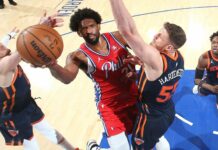On Thursday, Doc Rivers snatched an opportunity to sculpt a young tandem — Joel Embiid and Ben Simmons — whose stardom would tantalize any coach, but who have yet to make good on their talent. Rivers enters a Philadelphia 76ers organization with title aspirations that believes an upgrade on the bench can realize those expectations.
The Sixers have a ton of work to do, both in the front office and down on the court. They need shooters and shot creators so they can develop a competitive offensive gameplan. Rivers will be charged with the latter, but the bulk of Rivers’ grade will ultimately rest on how he corrals, inspires and teaches Embiid and Simmons.
It’s not unlike the move he made seven years ago, when Rivers left Boston for Los Angeles with an assignment to lead an intriguing LA Clippers team that had tasted some moderate success yet not achieved its full potential. The core of Chris Paul, Blake Griffin and DeAndre Jordan had exhausted its belief in Vinny Del Negro as head coach and wanted someone who could instill a championship spirit. With a rebuild scheduled in Boston, Rivers’ eye began to wander. When Paul and Griffin sent signals that his title-winning pedigree was precisely what the team needed, he jumped at the chance.
Over his next four years with the Lob City group, Rivers averaged more than 54 wins per season. There were extended stretches of optimism, and he provided sound structure to the offense and defense. Rivers’ leadership in 2014 during the Donald Sterling fiasco demonstrated the kind of gravitas and emotional intelligence that initially drew Paul and Griffin to him.
Ultimately, the Clippers never fulfilled their promise and disintegrated. Rivers wasn’t able to replicate the deft touch that brought the Big Three Boston Celtics together, and by the end he was as central a character in the workplace drama as any player on the roster. After a couple of transitional seasons, the franchise reeled in two prime superstars in Kawhi Leonard and Paul George but Rivers was again unable to get them to the Finals, losing a Game 7 to the Denver Nuggets in the second round on Sept. 15.
However disappointing the Clippers’ titleless seven-year run under Rivers, none of that deterred the Sixers’ brass from entrusting to him the responsibility of vaulting their team — and their two stars — to contention.
Rivers takes a special pleasure in challenging young players to set aside whatever perception they have of their games and to embrace a role that will be demanding, but rewarding. Soon after he landed the job in Los Angeles, Rivers met DeAndre Jordan at Nobu, the young center’s favorite haunt in Malibu. Rivers not only told Jordan to let go of his desire to be a more integral part of the offense, but that he shouldn’t expect to see one play call. Instead, Rivers said Jordan should focus his skills on becoming an all-NBA center who could anchor the Clippers’ defense. Jordan accepted the challenge and was named to three All-NBA and two All-NBA Defense teams.
It’s too early to glean what Rivers’ specific challenges to Embiid and Simmons will be, but rest assured there will be an imperative to improve. The on-court pieces of their game will likely be just one part of the new to-do list. Rivers will inherit his first team in 13 years in which its best players aren’t leaders, either by example or emotionally.
Those who have coached and played in Philadelphia over the past two years rarely characterize either young star in that vein. Simmons has a steely intensity, and Embiid’s charisma can be magnetic, but there are good reasons the Sixers acquired Jimmy Butler during the 2018-19 season, and sound explanations why a leadership vacuum appeared after his departure last offseason.
“It’s part of your job [as a head coach] to be truthful and to be hard on guys, to try to make them better teammates,” Rivers told ESPN in early September. “They’ve already in their mind figured out the basketball part — and maybe they have individually. But have they figured it out team-wise?”
Rivers noted at the time that he’s had his share of run-ins with players, and some have hated playing for him. But he emphasized that those disagreements were rarely about basketball. It’s over his insistence — and those who have played for him say it can be constant — that he understands, often better than they do, how they can help the team as a unit, both with their role on the court and their bearing off it.
“I am very involved in that, and some guys don’t like that,” Rivers said of those relationships between teammates. “I’m hard on guys. Playing right — I’m not going to let you play wrong. That’s just who I am in the basketball life. And some guys love that, and can play for that — and some guys don’t.”
Rivers will dispense trust, as he did this season when Leonard and Patrick Beverley came to him with an idea: Let the players watch film on their own, put together their own edit (a sequence of game clips), while the coaching staff does the same. The two groups would then present their edits accompanied by specific issues that need attention.
Though the Sixers might benefit from a system, Rivers has always been more of a pragmatist as a coach. When he thinks about his team away from the facility, he tends to imagine specific ways to free up his players for quality looks, rather than a specific structure to accommodate their skills. He has tendencies — for instance, he likes to generate half-court offense by empowering mobile, catch-and-shoot threats to move incessantly. But he’s not dogmatic. Whether it’s pace, packages and spacing, he’ll size up his roster and build around strengths.
Early in his tenure before the trust between them deteriorated, Rivers urged Griffin — self-critical to a fault — to be easier on himself, and encouraged him to tap the finesse in his game, an instinct Griffin had but wasn’t always confident putting into action. Finding the balance in Embiid’s portfolio will be a fun exercise in discovery. The defensive piece is there, but helping Embiid transform into more of an offensive fulcrum — how to make his basketball better “team-wise,” as Rivers says — will be interesting to watch when the 2021 season kicks off.
Rivers and Simmons are an interesting match. Both are introverts who prefer to keep their own company, though Rivers is more expressive — it’s a model for Simmons in elevating his locker room game while still being himself. On the floor, Simmons is the ultimate riddle. In the bubble, Simmons played a hybrid role — essentially, a point guard off a miss, and a mid-post power forward in half-court possessions. It’s a Rivers-esque stroke of pragmatism that might be preserved, but Rivers will need to unlock more. Simmons’ intuition is uncanny, and Rivers can best earn his trust by finding new ways for him to score.
For all the coaching in the arts of being a teammate and maximizing a player’s game, Rivers will excel if he can take pressure off Embiid and Simmons. To be clear, they absolutely must embrace their preeminent roles and perform best when it matters most. But Rivers will succeed as a head coach if he can alleviate the pressure when things aren’t going well in Philadelphia.
Rivers has always been among the best coaches in the league at taking arrows for his players with the front office, the media and the fan base. But if he had one particular failing with the Clippers’ early playoff ouster two weeks ago, it was not finding ways to come to the aid of the team during the tailspins in their final three losses. Leonard is uncommonly independent, even when the game is most trying, but there were moments during the 0-for-11 shooting droughts and Nuggets’ rampages when the team likely needed a lifeline — guidance in the form of a specific prescription. Rivers often doesn’t subscribe to that formula. The Clippers ultimately wilted under that pressure, as they did against Houston in 2015, the previous time they blew a 3-1 series lead. Trust between player and coach is the currency that ultimately drives a team’s economy. Rivers values that currency deeply, perhaps too deeply at times.
Now he gets a fresh start with a franchise that, like the Clippers, wants an emotional and tactical jump start. Its dynamic young stars need their roles refined, and their fortitude challenged. Given the Sixers’ hefty payroll, he must find additional skills hiding beneath the surface of the practice court. Above all, he’ll have to be the best version of Doc Rivers, the coach who commands respect by engendering trust, and uses it to full effect.
Source : ESPN














